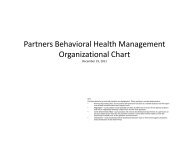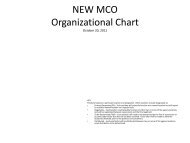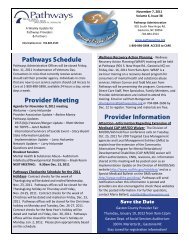what pathways wants you to know⦠- Partners Behavioral Health ...
what pathways wants you to know⦠- Partners Behavioral Health ...
what pathways wants you to know⦠- Partners Behavioral Health ...
- No tags were found...
Create successful ePaper yourself
Turn your PDF publications into a flip-book with our unique Google optimized e-Paper software.
December 3, 2007 PAGE 2PATHWAYS CHECKWRITE SCHEDULE FOR THE 2007 HOLIDAYSPathways will not be processing MCO checks <strong>to</strong> providers the week of Christmas (December 24-28,2007). This is due <strong>to</strong> the state payment schedule and the holiday schedule. EDS does not have a checkwrite <strong>to</strong>Pathways for the week of December 25th. Pathways IPRS closed network providers will receive their 1/12checks as normal by December 15th. MCO processing will begin again with a normal processing schedule andchecks will be mailed on Friday, January 4, 2008. Please plan appropriately based on this schedule. SAL keyingwill be open <strong>to</strong> Providers until the morning of January 2, 2008.SERIES ON INCIDENT REPORTINGOver the next several weeks Pathways LME will be providing a series on Incident Reporting. Each level ofincident will be covered along with the Quarterly Reports. The first <strong>to</strong> be covered is State Law, North CarolinaAdministrative Code and Level I (one) incident. The law which established incident reporting is found ingeneral statues 122C-112.1. This law gave the Secretary of the Department of <strong>Health</strong> and Human Servicesthe right <strong>to</strong> establish rules and guidance for the Department of MH/DD/SA. The rules for Incident Response,Area Authority Response <strong>to</strong> complaint and Area Authority Management of Incident, are outlined in theNorth Carolina Administrative Code (NCAC). The NCAC reference codes are 10A NCAC 27G. 0603, 10A NCAC27G. 0604, and 10A NCAC 27G. 0605. These codes specify that Categories A and B Providers shall report alllevel I,II,III incidents <strong>to</strong> the Local LME. Categories A and B providers are defined (10A NCAC 27G. 0602) as:♦ Category A are facilities licensed pursuant <strong>to</strong> G.S. 122C, article 2, except for hospitals. These include 24hour residential facilities, day treatment and outpatient services.♦ Category B are community based providers not requiring state licensure.The above laws and rules may be found atwww.ncga.state.nc.us/EnactedLegislation/Statutes/HTML/ByChapter/Chapter_122C.html - 618kWww.ncdhhs.gov/mhddsas/statspublications/manualsforms/aps/apsm30-01-6-06.pdfA level I (one) incident is defined as any happening which is not consistent with the routine operation of afacility or service, or the routine care of a client, that is likely <strong>to</strong> lead <strong>to</strong> adverse effects upon a client anddoes not meet the definition of a Level II or Level III incident. Level I incidents are events that, in isolatednumbers, do not significantly threaten the health or safety of an individual. These incidents require communicationamong the provider staff and documentation of the incident. In addition, aggregate information onLevel I incidents involving restrictive interventions, medication errors, and searches/seizures must be reported<strong>to</strong> the host LME on the quarterly report. Examples of (but not limited <strong>to</strong>) Level I incidents include:O Search and seizures (must have the appropriate policy and procedures)O Planned restricted intervention (must be part of the PCP or treatment plan)O Suicidal threats onlyO Consumer absence for less than three hours if police is not contactedO Any inappropriate behavior that did not require police department, fire department, emergency medicalservice, or an oversight agency contact (such as Department of Social Services or Department of<strong>Health</strong> Service Regulation)O Any consumer injury that requires first aid only as defined by Occupational Safety and <strong>Health</strong> Administration(OSHA) guidelinesA Level I (one) incident may be changed <strong>to</strong> a Level II or III based on the final results of an internal investigation.If this is the case, please document in the incident report that it was a level I incident until an internalinvestigation indicated the incident should be a Level II or III. The incident and death report shall be submittedwithin 72 hours of the conclusion of the investigation along with a copy of the internal investigation.To obtain further information of Incident and Death Reporting please visit the following web site:www.ncdhhs.gov/mhddsas/statspublications/manualsforms/incidentmanual11-04.pdf
December 3, 2007 PAGE 3WHAT THE STATE WANTS YOU TO KNOW…www.ncdhhs.gov/mhddsasCHANGES TO COMMUNITY SUPPORT SERVICESOn November 8, 2007, Dempsey Ben<strong>to</strong>n, the Secretary of the Department of <strong>Health</strong> and Human Services, releaseda plan <strong>to</strong> reform the service known as community support. The plan essentially has 3 components:1) Revisions <strong>to</strong> the Community Support Service definitions. The proposed revisions are available on the Divisionof Mental <strong>Health</strong>’s webpage, www.ncdhhs.gov/mhddsas/. Comments are being accepted until December11. The changes clarify the acceptable activities and expected outcomes, increase the role of theQualified Professional and change the authorization limitations for Medicaid consumers. Providers will need<strong>to</strong> submit modified billing codes <strong>to</strong> document qualified Professional and Paraprofessional/Associate Professionalservice delivery as of December 1, 2007.2) Mora<strong>to</strong>rium on new Community Support endorsements. No new providers (or locations) will be endorsedfor Community Support until at least July 2008. This means that providers of Community Support Child cannotadd Community Support Adult and that current providers cannot add additional sites.3) 10% Medicaid reimbursement withhold. Statewide 185 providers have been identified providing servicesthat are not medically necessary. The Department will be seeking pay back of funds for inappropriate servicesand these providers are under a Plan of Correction. Until the Plan of Correction and pay back are satisfied,10% of the provider’s Medicaid billing will be withheld. This 10% withhold applies <strong>to</strong> all Medicaid billableservices, not just Community Support.Pathways recognizes that these changes may impact some providers’ ability <strong>to</strong> remain in business or providethis service. Pathways requests that if <strong>you</strong> are no longer going <strong>to</strong> provide Community Support that <strong>you</strong> contactJay Taylor, jtaylor@pathmhddsa.org, (704) 842-6480 or Gayle Mahl, gmahl@pathmhddsa.org, (704) 842-6349so that we can help <strong>you</strong> coordinate the termination of services and facilitate consumers making a differentchoice of providers.The Department of <strong>Health</strong> and Human Services will be exploring additional opportunities <strong>to</strong> correct the misuseof this service.THE FOUNDATIONS PROJECT CORNERDEVELOPING A SYSTEM OF CARE CHILD AND FAMILY TEAMMany Child and Family Teams are started when a consumer participates in Mental <strong>Health</strong> Services, Depart-ment of Social Services, Department of Juvenile Justice, Delinquency Prevention, etc. The first thing <strong>to</strong> do isdefine the needs of <strong>you</strong>r child and family. Ask people who are aware of <strong>you</strong>r family strengths <strong>to</strong> be a part of<strong>you</strong>r CFT meeting. Children who are old enough <strong>to</strong> attend meetings, understand the process and who canmake sound judgments, may be on their own CFT’s. Select team members that will help <strong>you</strong> develop goodplans for the family and who have the knowledge, interest, and skills, that would strengthen <strong>you</strong>r team.How many people can <strong>you</strong> have on a CFT?Each team is different and may consist of anyone <strong>you</strong>r family feels would be helpful <strong>to</strong> <strong>you</strong> in achieving goals.You may want <strong>to</strong> ask team members about others in the community that would be good participants. Mem-bers may be added or dropped from the team as needed. The CFT Coordina<strong>to</strong>r plays a major role of the teamby helping organize, manage, and lead the meetings. They also assist by making sure that all of the membersknow about dates and times of meetings and also makes members aware of any changes in the consumersplan. System of Care Child and Family Teams are an important and valuable <strong>to</strong>ol <strong>to</strong> the family and consumerin helping produce successful outcomes. If <strong>you</strong> would like more information please contact Dawn Manus atdmanus@pathmhddsa.org.
December 3, 2007 PAGE 4THIS WEEK’S COMMUNITY RESOURCES2008-2009 2009 LILLY REINTEGRATION SCHOLARSHIPThe goal of the Lilly Reintegration Scholarship is <strong>to</strong> help people with schizophrenia, related schizophrenia-spectrum disorders, or bipolar disorder acquire the educational and vocational skills necessary <strong>to</strong> reintegratein<strong>to</strong> society, secure jobs, and regain their lives. Through the scholarship program, Eli Lilly and Company fur-thers its ongoing commitment <strong>to</strong> providing <strong>to</strong>ols that enhance the reintegration continuum, allowing people<strong>to</strong> move their lives forward and attain their individual potential. For more information about this scholar-ship opportunity, see the attachment included with this newsletter.HIV ETHICAL CONSIDERATIONS FOR MENTAL HEALTH PROFESSIONALSThe MH Professionals Support Group and The Mental <strong>Health</strong> Association will host a workshop entitled, “HIVEthical Considerations for Mental <strong>Health</strong> Professionals” on December 14, 2007 at 9:00-4:00pm. The work-shop will be held at the Cleveland County Family YMCA, 411 Cherryville Highway, Shelby, NC. The trainingwill be presented by the NC AIDS Education and Training Center at Duke University in Durham, NC. The cos<strong>to</strong>f the workshop is $25 for each participant. If <strong>you</strong> have any questions or would like <strong>to</strong> register for this train-ing please contact Laura Rudisill at (704) 482-2977 2977 or email llrudisill@earthlink.net, , Kimberly M. Walker at(919) 286-4130 or email km.walker@duke.edu or Renee Gray at (704) 481-8637 8637 or emailPATHWAYS EVENT CALENDAR12/06-07/07 Introduction <strong>to</strong> Dialectic Behavior Therapy (TIP training), at the NC Council Conference Center (3801 Hillsborough St., Raleigh, NC). Online registration at www.nc-council.org12/08/07 Community Support Service Definition at Carolina <strong>Health</strong> Information Consulting (1538 A Union Rd.,Gas<strong>to</strong>nia). To register, contact Janet Hensley at (704) 824-6060.12/10/07 Recovery Skills Training 9:00am – 4:30pm by Marcia Thompson at Pathways LME; $35 by 12/10; $40 lateregistration. Mail registration form (Pathways website> For Providers> Training) and check or money order<strong>to</strong>: Marcia Todd Thompson, PO Box 2591, Gas<strong>to</strong>nia, NC 28053.12/12/07 Medical Records Training in the Pathways audi<strong>to</strong>rium; $22 payable in advance <strong>to</strong> Pathways, 10:00-12:00 am.To register, email lme-education@pathmhddsa.org.12/12/07 NC SNAP Training 10:00am-1:00pm by Regina Blalock at J. Iverson Riddle Development Center. To register,email completed NC SNAP registration form <strong>to</strong> lme-education@pathmhddsa.org (under “training” on FORPROVIDERS page). (Class is full.)12/13/07 Service Note Documentation for Enhanced Benefit Services 9:00am – 4:30pm by Marcia Thompson atPathways LME; $35 by 12/11; $40 late registration. Mail registration form (Pathways website> For Providers> Training) and check or money order <strong>to</strong>: Marcia Todd Thompson, PO Box 2591, Gas<strong>to</strong>nia, NC 28053.01/07/08 FA/CPR/AED Instruc<strong>to</strong>r Course, $100. This course is conducted in five evenings over a two week period. Toregister call the American Red Cross at (704) 864-2623. Pre-registration and payment is required.01/14-16/08 Personal Outcome and Individualized Support Measures by Ramon Santiago in the Pathways Board Room.This training introduces the learner <strong>to</strong> Personal Outcome Measures as the basis for quality enhancement inhuman services and provides participants with a practical ‘hands on’ experience working with focus people <strong>to</strong>determine personal outcomes and supports. To Register: http://www.unc.edu/depts/ddti/For Computer trainings, see the MIS Training Calendar on the Pathways website (www.pathmhddsa.org > For ProvidersPage > Training). To schedule for MIS trainings call Rena Watkins at (704) 842-6429 or email rwatkins@pathmhddsa.orgDisclaimer: While we offer the information about training that is available, Pathways does not endorse or approve anytrainings/trainers other than those offered by Pathways.The Pathways Monday Coffee Break is edited by Chrystal Lovelace. Please direct suggestions, comments, and possible submissions<strong>to</strong> clovelace@pathmhddsa.org or (704) 842-6410.








